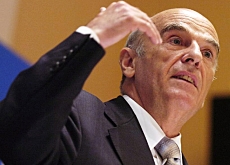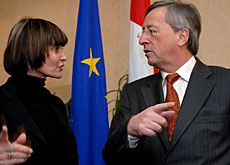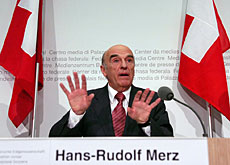VAT should become less taxing

The government has come out in favour of simplifying Switzerland's Value Added Tax (VAT), with one rate possibly replacing the three currently in use.
The preferred scenario among those tabled would be to reduce VAT from 7.6 to six per cent and do away with most of the current 25 exceptions.
The cabinet opened a consultation procedure on Thursday in Bern, giving interested parties until July 31 to respond to the proposals.
Finance Minister Hans-Rudolf Merz called for a complete overhaul of the VAT law, listing 50 measures to ease the administration of tax collection and improve transparency. However, the three rates used today would be kept and the exceptions would remain.
Going one step further, Merz’s preferred option is for a single six per cent rate, with exceptions only being made for rental properties, property transactions, banks, life insurance and agriculture.
It would replace the main rate of 7.6 per cent, the reduced rate of 2.4 per cent applied to essential consumer goods and the 3.6 per cent added to hotel bills.
In this scenario, the extra cost for private households would be around SFr6.30 per month ($5.10).
Health tax
The new single rate would be applied for the first time to services in the fields of education, research, culture and sport as well as the health and social insurance sectors.
But the single rate could also be upped to 6.4 per cent, which would permit the health sector to be exempted.
Merz said he did not favour this latter version, but added that a tax on the country’s health services needed to be debated since it was a hot political issue.
Another proposal would reduce the three rates to two, one at 7.6 per cent and a lower rate of 3.4 per cent, applied to essential goods and services currently enjoying an exemption, including the health sector.
Merz said the aim of the reforms was not to generate more revenues. While the average person’s monthly tax bill will increase, they will pay less for example for cars, furniture and clothing as well as food and drink in restaurants.

More
Consultation procedure
Consumers
In a first reaction, the main consumer protection organisation said it feared a general rise in prices and demanded that health services remain exempt.
The employers’ association, economiesuisse, welcomed efforts to introduce a single rate and reduction of exemptions.
The head of Switzerland’s main hotel association, hotelleriesuisse, Christoph Juen, said the two-rate model was politically the most feasible, as long as exemptions could still be made.
The umbrella organisation for health insurance companies, santésuisse, is opposed to the plan to apply VAT to health services. A spokesman said this would lead companies to pass on the extra costs to the insured.
The political parties represented in government were also divided over the issue. The centre-right Radicals favour the single rate, which is rejected by both the centre-right Christian Democrats and the rightwing Swiss People’s Party.
The centre-left Social Democrats said a flat rate would only create new privileges.
EU
Two countries in the European Union – Denmark and Slovakia – have already introduced a single VAT, but at much higher rates, 25 and 19 per cent respectively.
VAT rates across the EU range from 15 per cent in Cyprus and Luxembourg to 25 per cent in Sweden and Denmark.
But most EU states have reduced rates for certain goods such as books, newspapers, medications and food. Hotels are also given a preferred rate in Austria, France and Italy.
swissinfo with agencies
Value Added Tax was introduced in 1995 to replace a turnover tax on goods.
The main rate is 7.6%.
Essential consumer goods such as food, non-alcoholic drinks, medications and books and newspapers are taxed at 2.4%.
Hotels are only required to add 3.6% to their guests’ hotel bill.
Banks, insurance, hospitals and agriculture are among the 25 sectors exempt.
VAT generated revenues of SFr19 billion in 2006.

In compliance with the JTI standards
More: SWI swissinfo.ch certified by the Journalism Trust Initiative



You can find an overview of ongoing debates with our journalists here. Please join us!
If you want to start a conversation about a topic raised in this article or want to report factual errors, email us at english@swissinfo.ch.